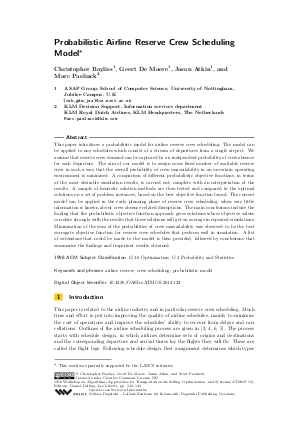Probabilistic Airline Reserve Crew Scheduling Model
Authors Christopher Bayliss, Geert De Maere, Jason Atkin, Marc Paelinck
-
Part of:
Volume:
12th Workshop on Algorithmic Approaches for Transportation Modelling, Optimization, and Systems (ATMOS 2012)
Part of: Series: Open Access Series in Informatics (OASIcs)
Part of: Conference: Symposium on Algorithmic Approaches for Transportation Modelling, Optimization, and Systems (ATMOS) - License:
 Creative Commons Attribution-NoDerivs 3.0 Unported license
Creative Commons Attribution-NoDerivs 3.0 Unported license
- Publication Date: 2012-09-13
File

PDF
OASIcs.ATMOS.2012.132.pdf
- Filesize: 412 kB
- 12 pages
Document Identifiers
Subject Classification
Keywords
- airline reserve
- crew scheduling
- probabilistic model
Metrics
- Access Statistics
-
Total Accesses (updated on a weekly basis)
0PDF Downloads0Metadata Views
Abstract
This paper introduces a probabilistic model for airline reserve crew scheduling. The model can be applied to any schedules which consist of a stream of departures from a single airport. We assume that reserve crew demand can be captured by an independent probability of crew absence for each departure. The aim of our model is to assign some fixed number of available reserve crew in such a way that the overall probability of crew unavailability in an uncertain operating environment is minimised. A comparison of different probabilistic objective functions, in terms of the most desirable simulation results, is carried out, complete with an interpretation of the results. A sample of heuristic solution methods are then tested and compared to the optimal solutions on a set of problem instances, based on the best objective function found. The current model can be applied in the early planning phase of reserve crew scheduling, when very little information is known about crew absence related disruptions. The main conclusions include the finding that the probabilistic objective function approach gives solutions whose objective values correlate strongly with the results that these solutions will get on average in repeated simulations. Minimisation of the sum of the probabilities of crew unavailability was observed to be the best surrogate objective function for reserve crew schedules that perform well in simulation. A list of extensions that could be made to the model is then provided, followed by conclusions that summarise the findings and important results obtained.
Cite As Get BibTex
Christopher Bayliss, Geert De Maere, Jason Atkin, and Marc Paelinck. Probabilistic Airline Reserve Crew Scheduling Model. In 12th Workshop on Algorithmic Approaches for Transportation Modelling, Optimization, and Systems. Open Access Series in Informatics (OASIcs), Volume 25, pp. 132-143, Schloss Dagstuhl – Leibniz-Zentrum für Informatik (2012)
https://doi.org/10.4230/OASIcs.ATMOS.2012.132
BibTex
@InProceedings{bayliss_et_al:OASIcs.ATMOS.2012.132,
author = {Bayliss, Christopher and De Maere, Geert and Atkin, Jason and Paelinck, Marc},
title = {{Probabilistic Airline Reserve Crew Scheduling Model}},
booktitle = {12th Workshop on Algorithmic Approaches for Transportation Modelling, Optimization, and Systems},
pages = {132--143},
series = {Open Access Series in Informatics (OASIcs)},
ISBN = {978-3-939897-45-3},
ISSN = {2190-6807},
year = {2012},
volume = {25},
editor = {Delling, Daniel and Liberti, Leo},
publisher = {Schloss Dagstuhl -- Leibniz-Zentrum f{\"u}r Informatik},
address = {Dagstuhl, Germany},
URL = {https://drops.dagstuhl.de/entities/document/10.4230/OASIcs.ATMOS.2012.132},
URN = {urn:nbn:de:0030-drops-37091},
doi = {10.4230/OASIcs.ATMOS.2012.132},
annote = {Keywords: airline reserve, crew scheduling, probabilistic model}
}
